人教新课标高二选修8 Unit 4 Pygmalion单元复习课件(68张)
文档属性
| 名称 | 人教新课标高二选修8 Unit 4 Pygmalion单元复习课件(68张) |  | |
| 格式 | zip | ||
| 文件大小 | 530.9KB | ||
| 资源类型 | 教案 | ||
| 版本资源 | 人教版(新课程标准) | ||
| 科目 | 英语 | ||
| 更新时间 | 2017-01-18 10:23:01 | ||
图片预览


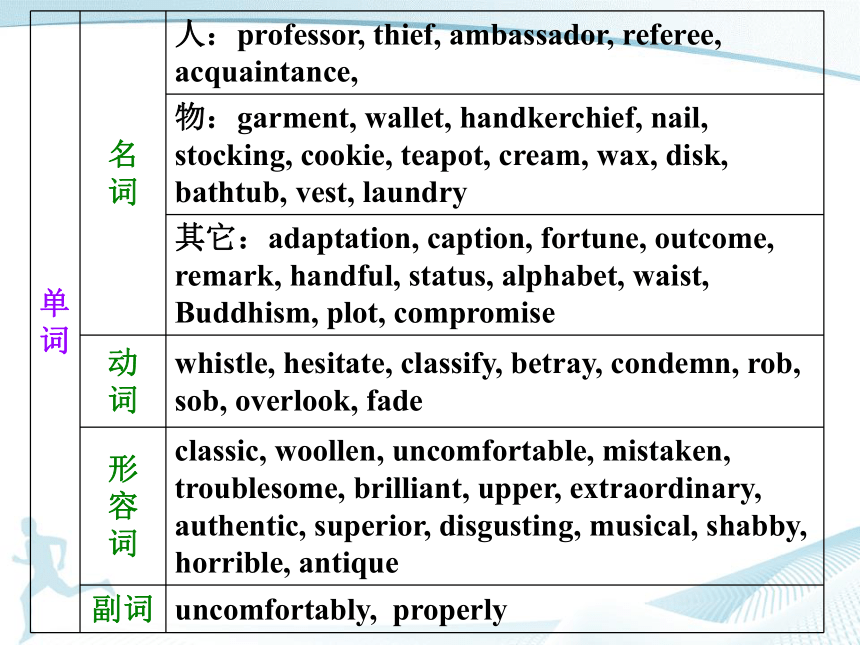
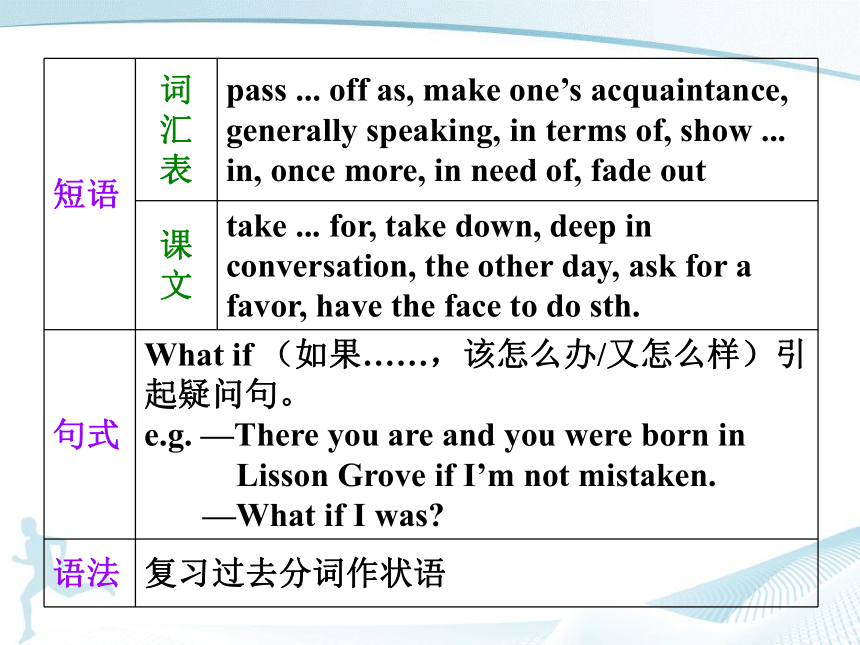
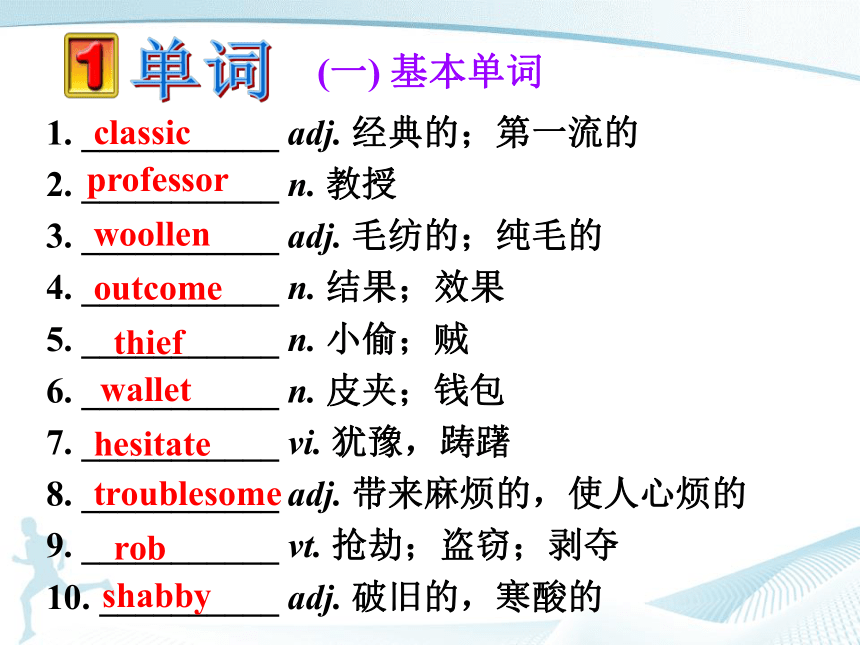
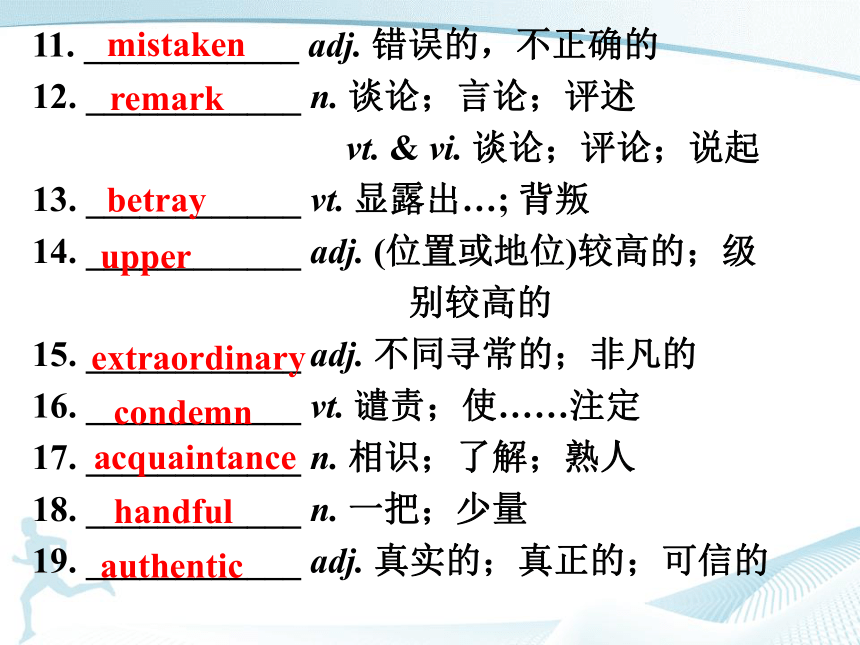
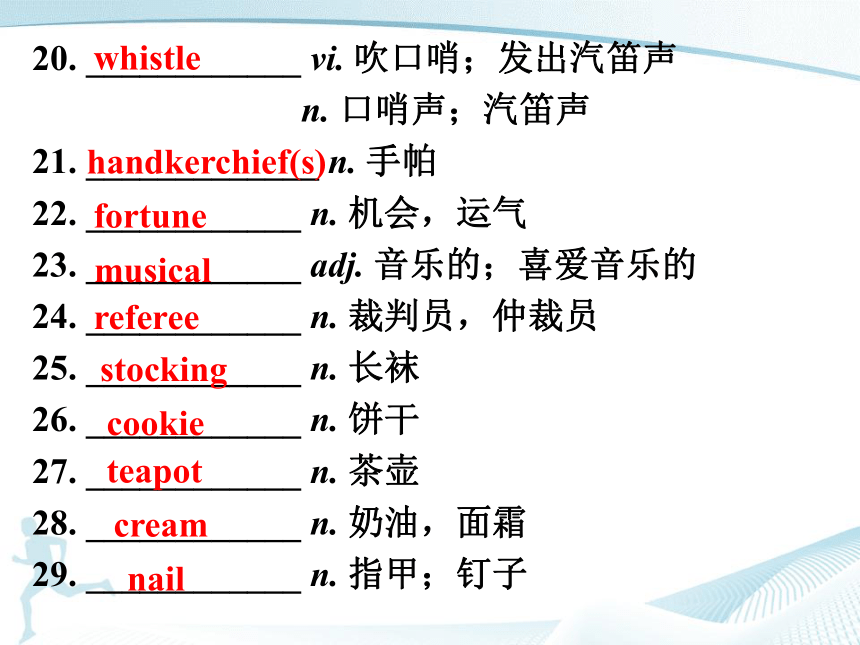
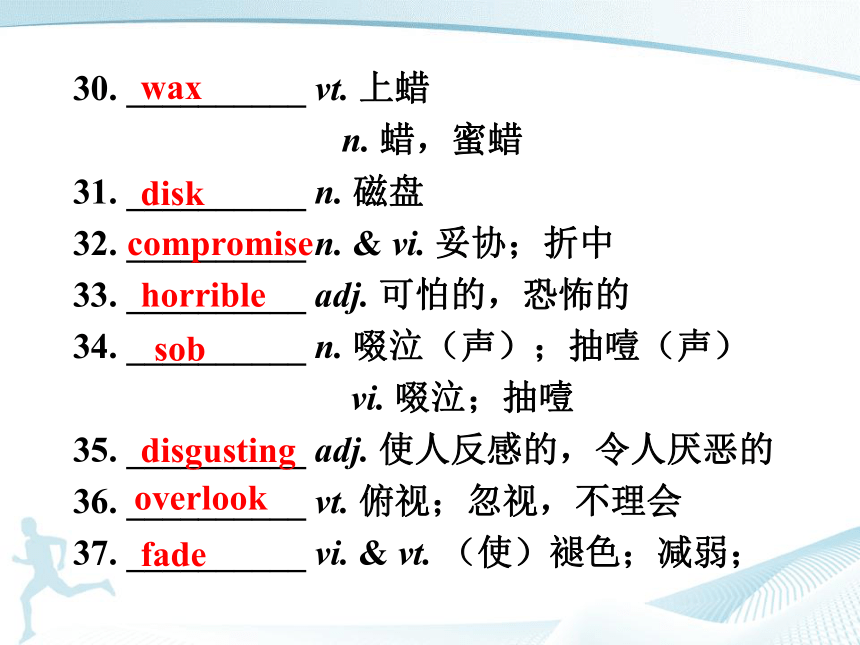
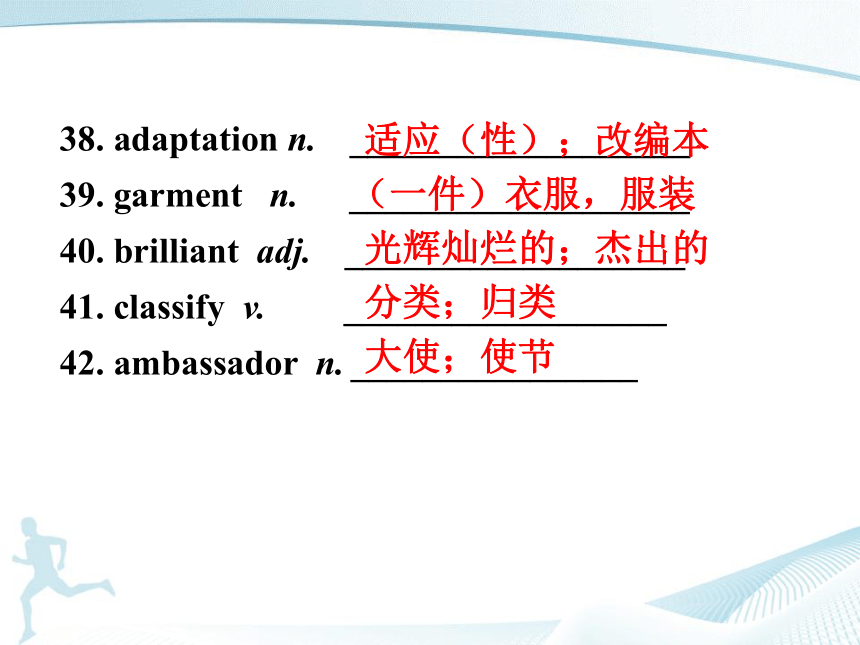
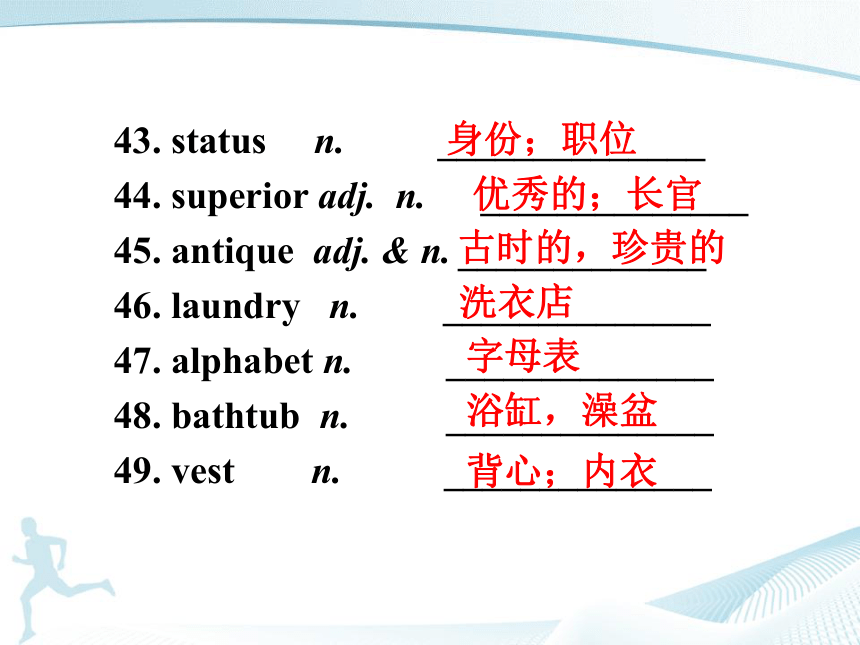
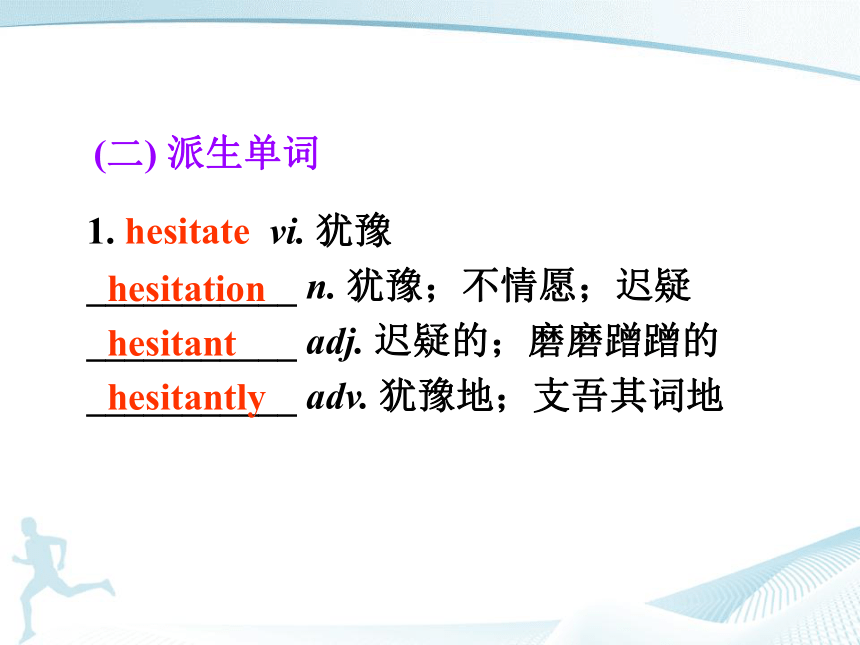
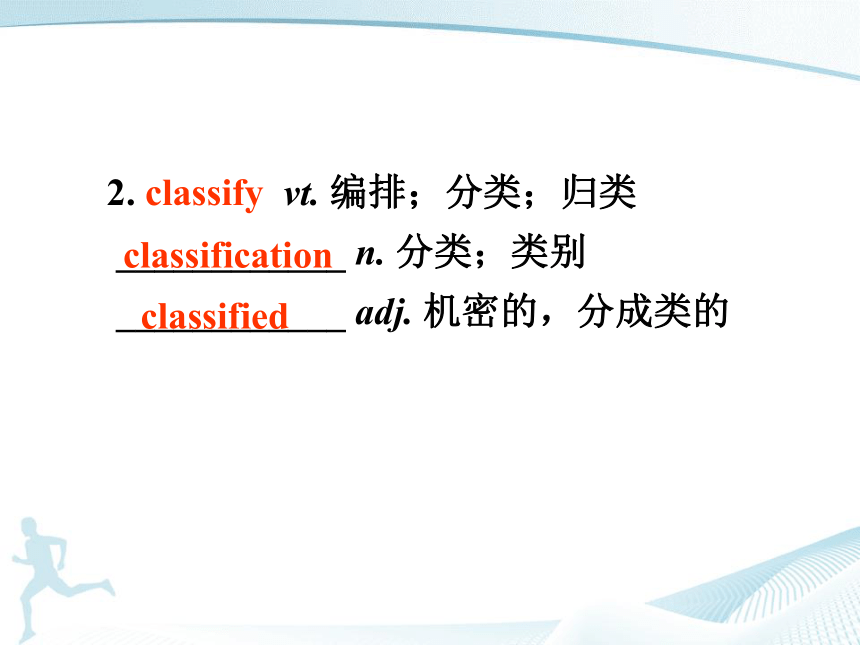
文档简介
课件68张PPT。Unit 4
Pygmalion知识清单1. ___________ adj. 经典的;第一流的
2. ___________ n. 教授
3. ___________ adj. 毛纺的;纯毛的
4. ___________ n. 结果;效果
5. ___________ n. 小偷;贼
6. ___________ n. 皮夹;钱包
7. ___________ vi. 犹豫,踌躇
8. ___________ adj. 带来麻烦的,使人心烦的
9. ___________ vt. 抢劫;盗窃;剥夺
10. __________ adj. 破旧的,寒酸的professorhesitatetroublesomerobshabbyclassicwoollenoutcomethiefwallet(一) 基本单词单词11. ____________ adj. 错误的,不正确的
12. ____________ n. 谈论;言论;评述
vt. & vi. 谈论;评论;说起
13. ____________ vt. 显露出…; 背叛
14. ____________ adj. (位置或地位)较高的;级
别较高的
15. ____________ adj. 不同寻常的;非凡的
16. ____________ vt. 谴责;使……注定
17. ____________ n. 相识;了解;熟人
18. ____________ n. 一把;少量
19. ____________ adj. 真实的;真正的;可信的remarkacquaintanceauthentichandfulmistakenbetrayupperextraordinarycondemn20. ____________ vi. 吹口哨;发出汽笛声
n. 口哨声;汽笛声
21. _____________ n. 手帕
22. ____________ n. 机会,运气
23. ____________ adj. 音乐的;喜爱音乐的
24. ____________ n. 裁判员,仲裁员
25. ____________ n. 长袜
26. ____________ n. 饼干
27. ____________ n. 茶壶
28. ____________ n. 奶油,面霜
29. ____________ n. 指甲;钉子whistlehandkerchief(s)fortunemusicalrefereestockingcookieteapotcreamnail30. __________ vt. 上蜡
n. 蜡,蜜蜡
31. __________ n. 磁盘
32. __________ n. & vi. 妥协;折中
33. __________ adj. 可怕的,恐怖的
34. __________ n. 啜泣(声);抽噎(声)
vi. 啜泣;抽噎
35. __________ adj. 使人反感的,令人厌恶的
36. __________ vt. 俯视;忽视,不理会
37. __________ vi. & vt. (使)褪色;减弱;waxdiskcompromisehorriblesobdisgustingoverlookfade38. adaptation n. ___________________
39. garment n. ___________________
40. brilliant adj. ___________________
41. classify v. __________________
42. ambassador n. ________________适应(性);改编本(一件)衣服,服装光辉灿烂的;杰出的分类;归类大使;使节43. status n. ______________
44. superior adj. n. ______________
45. antique adj. & n. _____________
46. laundry n. ______________
47. alphabet n. ______________
48. bathtub n. ______________
49. vest n. ______________身份;职位优秀的;长官古时的,珍贵的洗衣店字母表浴缸,澡盆背心;内衣1. hesitate vi. 犹豫
___________ n. 犹豫;不情愿;迟疑
___________ adj. 迟疑的;磨磨蹭蹭的
___________ adv. 犹豫地;支吾其词地hesitantlyhesitationhesitant(二) 派生单词2. classify vt. 编排;分类;归类
____________ n. 分类;类别
____________ adj. 机密的,分成类的classifiedclassification3. remark n. 谈论;言论; v. 谈论;评论
__________ adj. 值得注意的;显著的
__________ adv. 引人注目地;非凡的remarkablyremarkable4. rob vt. 抢劫;盗窃;剥夺
___________ n. 抢劫;抢夺;偷取
___________ n. 强盗;盗贼;抢夺者 ____________ [搭配]夺取某人某物robberyrobberrob sb. of sth.1. 作记录 ___________________
2. 把……当成…… ___________________
3. 把……递给…… ___________________
4. (把某人)改变或冒充成…… ________________
5. 一把,少量的 ______________make notes/take notestake sb. for sth.hand overpass… off as…a handful of短语6. 庆祝一番 ________________
7. 相识,了解 ______________________
8. 被指控 _______________
9. 抱怨 _______________
10. 在地球上;究竟 _______________have a celebrationmake one’s acquaintancebe accused ofcomplain ofon earth11. in amazement ______________
12. generally speaking ______________
13. the other day ___________
14. in terms of … ______________________
15. in need of ____________惊讶;震惊一般来说前几天就……来说;从……角度需要……16. begin with ____________
17. in disguise ____________
18. ask for favors ____________
19. fade out _________________从……开始伪装;假扮求某人帮忙逐渐模糊;渐淡 What if I was?
2. I thought maybe you was a policeman
in disguise.
3. Suppose you have a chance to help Eliza
improve her use of the English language. 句式核心要点1. hesitate vi. 犹豫,迟疑不决;顾虑,疑虑
[课文原句] A gentleman (G) passes and
hesitates for a moment.
这时有位先生(先)从这儿路过,
他迟疑了片刻。
【归纳】
hesitate to do sth.
对做某事有顾虑,不愿做某事
hesitate about/in/at/over (doing) sth.
对(做)某事犹豫不决单词【拓展】
hesitation n. 犹豫,疑虑
without (any) hesitation 毫不犹豫地
have no hesitation in doing sth.
毫不犹豫地做某事[即景活用]
① ________ ________, Meng Xiangbin
jumped into the river to save the drowning
young woman.
孟祥斌毫不犹豫地跳下河去救落水的年
轻女子。Without hesitation② Premier Li said “The government will not
________ ________ help you out of poverty.”
李总理说“政府会毫不犹豫地帮你摆脱贫
困。”
③ She seems to ________ _____ ________
the private question.
她好像不愿意回答这个私人问题。hesitate tohesitate about answering2. classify vt. 编排;分类;归类
[课文原句] Simply phonetics studied and classified from people’s own speech.
对人的发音进行研究、分类,仅此而已。3. remark n. 谈论;言论;评述
vt. & vi. 谈论;评论;说起
[课文原句] You can place a man by just a few remarks.
你可以根据几句话判定(对方)是哪个地方的人。[即景活用]
① It’s rude to mark a remark ________ the
appearance of others.
对别人的相貌品头论足是没有礼貌的。
② He _____ __ ________ ___ the issue.
他对这个问题没发表任何评论。on/ uponmade no remarks on4. betray vt. 泄露(秘密);出卖;背叛
[课文原句]But they betray themselves every time they open their mouths.
但他们每次一张嘴就暴露了他们自己。
[点拨]
betray在表示“泄露秘密”时,其同义词组是let out。5. condemn vt.
[课文原句] Look at this girl with her terrible English, the English that will condemn her to he gutter to the end of her days.
你瞧那个姑娘,英语说得那样糟糕,命中注定要在贫民窟里呆一辈子了。【归纳】
① 谴责。常用结构:condemn sth. / sb. as
sth.把……指责为……;condemn sb. for
(doing) sth. 因某事而指责某人。
② 判(某人)刑(尤指死刑)。常用结构:
be condemned to death。
③ 迫使(某人)处于某状态。常用结构:
condemn sb. to sth. / to do sth. 。 6. acquaintance n. 相识;了解;熟人
[课文原句] And I came to England to make your acquaintance.
我也正是到英国来找你的。[点拨]
acquaintance用作不可数名词时,表“熟悉,认识”,有时在其前加不定冠词,表某种程度的熟悉与了解,与with连用;用作可数名词时,表“熟悉的人”。[即景活用]
—What did he come here for?
—He came here especially to _____ your
acquaintance.
A. take B. get C. make D. produceC7. fortune n. 财产,大笔的钱;机会;运气[点拨]
表示“命运、运气”时,fortune是不可数名词,表示“发财、财富”时,常用a fortune。[即景活用]
① ___________, the fire was discovered soon
after it had started.
幸好火势刚起就立即被发现了。
② Now many villagers go to the big cities to
____ ____ _______.
现在很多村民去大城市碰运气。Fortunately seek their fortune [真题呈现]
(2010·全国Ⅰ) The discovery of gold in Australia led thousands to believe that a fortune ________.
A. is made B. would make
C. was to be made D. had madeC8. compromise n. & vi. 妥协;折衷
【归纳】
reach a compromise 达到妥协
compromise on sth.
违背(原则);达不到(标准)[即景活用]
① After a long talk, the two sides ________ a
compromise.
经过长期的谈判,双方达成了妥协。reached② Encourage your children to reach a(n)
________ between what he wants and
what you want.
A. achievement B. appointment
C. compromise D. adaptationC9. overlook vt.
[课文原句] But you cannot overlook that!
你可不能小看这个问题了!
【归纳】
① 俯瞰 ② 忽视,忽略,没看到。
③ 原谅,宽恕,不计较。
比较:ignore也有“不理睬,忽视”之意,但只指有意识地拒绝、故意不予理会或“故意这样做” 的意思。10. fade
[课文原句] (fades out as they go off stage together)
两人一道朝台下走去,声音逐渐减弱。
【归纳】
v. 意为“(使)褪色,减弱,逐渐消失,(花朵)枯萎,凋谢”。
【拓展】
fade away逐渐消失
fade in / fade out(画面)淡入/淡出,渐显/渐隐,(声音)渐强/渐弱[即景活用]
My enthusiasm for Chinese football team gradually ________ because of their countless failures.
A. grew B. faded
C. ran out D. gave upB1. generally speaking 一般来说
【拓展】
strictly speaking 严格地说
frankly speaking 坦白地说
broadly speaking 泛泛地说
roughly speaking 粗略地说
personally speaking 就个人而言
exactly speaking 确切地说短语2. in terms of 就……来说,从……角度
[课文原句] Correct all these sentences in terms of grammar spelling, ect., so that she can use them properly.
从语法、拼写等方面改正这些句子,好让她恰当使用。
【归纳】其后可跟名词,也可跟从句。
come to terms with达成协议,和好;接受;适应
be on good/bad terms关系良好/不好
in the long/short term就长远/短期而言
in one's terms在某人看来【拓展】
in charge of负责 in search of寻找
in honour of 向……表示敬意
in need of 需要 in favour of 赞成,支持
in case of 如果,假使 in place of 代替
in memory of 纪念 in possession of 占有
in control of 控制,管理,掌握
in praise of 赞扬3. in need 表示“(食物、钱或生活来源的)短缺,缺乏”。表示“需要什么”,用in need of,of后需加宾语。
【拓展】处于……之中
in trouble 处在麻烦中????
in difficulty 处在困难中
in danger 处在危险中????
in good health 身体状况好
in order 有秩序?????????
in a hurry 匆匆忙忙[即景活用]
The charity aims to provide assistance for people ________.
A. in demand B. in need
C. into trouble D. in need ofB What if I was?
如果我是……又怎么样?
句型:What if...?
如果……将会怎么样?/又有什么关系?句式2. I thought maybe you was a policeman
in disguise.
句型:I thought (that)...
我原以为……3. Suppose you have a chance to help Eliza
improve her use of the English language.
句型:Suppose that(=supposing that)...
假设……
suppose用来表示条件时,相当于if (假设)。考点一:过去分词作状语,表示原因、时
间、条件等。
1. Clearly and thoughtfully _____, the book inspires confidence in students who wish to seek their own answers. ? ?
A. writing??? ?????? B. to write?? ???????
C. written?? ??????????D. being written
write与book间是逻辑上的动宾关系,write表示的动作已发生。语法过去分词点拨(二)2. _____ in the early 20th century, the school keeps on inspiring children’s love of art.
A. To found??? ? ??? B. Founding??????????
C. Founded???? ? ???? D. Having founded
found与school之间是逻辑上的动宾关系。
3. _____ with care, one tin will last for six weeks.? ?(北京2012)
A. Use????? B. Using ?????? ?????
C. Used ????? D. To use
use与tin之间是逻辑上的动宾关系。4. ________ (raise) in the poorest area of
Glasgow, he had a long, hard road to
becoming a football star.????? ???(重庆2015)
设空处作原因状语,因raise与he之间是逻辑
上的动宾关系,且raise表示的动作已发生,
故填Raised。 Raised考点二:“连词+过去分词”作状语。
1. Children, when _____ by their parents, are allowed to enter the stadium. (2014湖南)
A. to be accompanied??????????
B. to accompany??????????
C. accompanying?????????
D. accompanied
accompany与Children之间是逻辑上的动宾关系,是状语从句的省略,完整为when they are accompanied by their parents。2. If ________ (accept) for the job, you'll be informed soon.??????? (北京2015)
If与设空处构成“连词+过去分词”结构,accept与you之间是逻辑上的动宾关系,故填accepted。此处是条件状语从句的省略,还原后是If you are accepted for the job。 accepted考点三:过去分词构成的独立结构。
Much time ________ (spend) sitting at a desk, office workers are generally troubled by health problems.????? ???(江苏2015)
【点拨】 Much time与设空处构成独立主格结构,因spend与time之间是逻辑上的动宾关系,故填spent。spent【即学即练】用括号内动词正确形式填空。
?????? When 1. ______ (ask) about poetry, most people will say that a poem is a text 2. _______ (have) rhythm and rhyme. Famous are the lines 3. _______ (write) by William Blake, which have clear rhythm and rhyme. Others will add that poems must have a certain form with a fixed number of lines and a fixed rhyme pattern, such as a sonnet. asked?having writtenApart from some short songs and poems 4. ________ (include) in his plays, all of Shakespeare’s greatest poems are sonnets. John Milton was one of the first poets 5. _______ (start) writing poems without rhyme at the end of the lines. Once 6. _________ (publish), his work became famous for the absence of rhyme at the end of each line.includedto startpublished写作如何写英语戏剧【指导】
戏剧作品是一种文学形式,同小说一样也有情节(plot),人物(character),背景(setting),主题(theme)和风格(style),但它的表现形式却与小说不同。戏剧一般分幕(act)和场(scene)。幕是剧本写作和演出的一个完整段落,按剧情发展的时间、地点划分。场则是幕中的部分。有的剧只分幕,不分场。 剧本故事完全在角色的直接对话中展开,读者要通过对话的内容及语言风格(也包括一些简单的动作描述)去揣摩每个人物的性格、心理、教育程度和社会背景等。其次,读者还要从对话中分析人物之间的关系或冲突,进而推断出作者的写作目的。因此,写英语戏剧必须仔细琢磨每个人物的每一句话,不但要注意每句话的字面意义,还要注意其所展示的剧中人物的特点和蕴含的社会意义。
英语戏剧应包括剧本的三要素:舞台说明、戏剧冲突、人物台词。1. 舞台说明
舞台说明帮助导演和演员掌握剧情,为演出提供相关说明。舞台说明用括号或斜体字标出,且多用一般现在时。
2. 戏剧冲突
剧中必须有一个矛盾冲突(问题)供人物去解决,剧中所有的事件都与该冲突有关。故事不但应该有完整的情节,即故事发生的时间、地点、环境,故事的起因、高潮、结尾等,而且应该让人看过之后有所思、有所想。3. 人物台词
台词是剧中人物的语言,即鲜明生动的对话。它是同人物的行为动作联系在一起的。同时人物的语言和动作必须合乎各自的身份和特征。台词的表现形式有:对话、独白、旁白、内白(在后台说话)、潜台词等。由于剧本常常以对话形式来表现人物,所以剧本中人物的语言要口语化、生活化,强调真实感。巩固练习I. 用括号内单词的正确形式填空。
1. The television __________ (adapt) of the stage play was very successful.
2. The girl felt _____________ (comfort) lying on that hard, cold floor and began to cry.
3. Being short of money is a bit ___________ (trouble) but we’ll do what we can. adaptationuncomfortabletroublesome?4. If you think you can carry on drinking so much without damaging your health, then you’re?________ (mistake).
5. The boy’s ____________ (ordinary) height singled him out even among basketball players.
6. I think you should take it somewhere to have it mended ________ (proper).
7. The family all play instruments — they’re all very _______ (music).mistakenextraordinaryproperlymusicalII. 用适当的介词或副词填空。
1. Biologists classify animals and plants _____ different groups.
2. On several occasions she had remarked ________ the boy’s improvement.
3. The papers were quick to condemn him _____ his mistake.
4. The boy picked up a handful _____ stones and started throwing them at the dog.
5. It is a small country both _____ terms of size and population.into?on/uponfor?of in6. They threatened to shoot him and robbed him _____ all his possessions.
7. They bought up pieces of old furniture and passed them _____ as valuable antiques.
8. These homeless children are in need _____ help.
9. As the programme ended, their conversation was faded _____.
10. Your computer is far superior _____ mine.of?offofouttoIII. 阅读材料,在空白处填入适当的内容。
In mythology (神话), Pygmalion was a sculptor 1. ________ did not like women. He couldn’t find a woman 2. ______ (love). And he decided to make a statue, Galatea. In George Bernard Shaw’s play, Pygmalion and Galatea 3. ____________ (compare) to Professor Higgins and Eliza. Pygmalion made Galatea his ideal woman. And Professor Higgins changes Eliza into 4. ____ perfect upper-class woman. who/thatto loveare comparedaHe teaches her 5. _____ to talk and behave in front of people. This process of making Eliza an upper-class woman is criticized as 6. _______ (play) with a living doll, as though she doesn’t have her own soul. Higgins treats her as an object.
Also, the common expectation of audiences 7. _____ women’s fate is determined by men is criticized. It is because of Eliza’s reaction after the success of pretending to be a duchess.howplayingthatShe thinks the two options 8. ________ (suggest) by Higgins would be selling herself.
When she was selling flowers, at least she didn’t have to sell herself. She doesn’t want to rely 9. _____ a rich man, and decides to marry a poor man, Freddy. She says she can make something of him. She values love more than anything 10. _____.suggestedon?else
Pygmalion知识清单1. ___________ adj. 经典的;第一流的
2. ___________ n. 教授
3. ___________ adj. 毛纺的;纯毛的
4. ___________ n. 结果;效果
5. ___________ n. 小偷;贼
6. ___________ n. 皮夹;钱包
7. ___________ vi. 犹豫,踌躇
8. ___________ adj. 带来麻烦的,使人心烦的
9. ___________ vt. 抢劫;盗窃;剥夺
10. __________ adj. 破旧的,寒酸的professorhesitatetroublesomerobshabbyclassicwoollenoutcomethiefwallet(一) 基本单词单词11. ____________ adj. 错误的,不正确的
12. ____________ n. 谈论;言论;评述
vt. & vi. 谈论;评论;说起
13. ____________ vt. 显露出…; 背叛
14. ____________ adj. (位置或地位)较高的;级
别较高的
15. ____________ adj. 不同寻常的;非凡的
16. ____________ vt. 谴责;使……注定
17. ____________ n. 相识;了解;熟人
18. ____________ n. 一把;少量
19. ____________ adj. 真实的;真正的;可信的remarkacquaintanceauthentichandfulmistakenbetrayupperextraordinarycondemn20. ____________ vi. 吹口哨;发出汽笛声
n. 口哨声;汽笛声
21. _____________ n. 手帕
22. ____________ n. 机会,运气
23. ____________ adj. 音乐的;喜爱音乐的
24. ____________ n. 裁判员,仲裁员
25. ____________ n. 长袜
26. ____________ n. 饼干
27. ____________ n. 茶壶
28. ____________ n. 奶油,面霜
29. ____________ n. 指甲;钉子whistlehandkerchief(s)fortunemusicalrefereestockingcookieteapotcreamnail30. __________ vt. 上蜡
n. 蜡,蜜蜡
31. __________ n. 磁盘
32. __________ n. & vi. 妥协;折中
33. __________ adj. 可怕的,恐怖的
34. __________ n. 啜泣(声);抽噎(声)
vi. 啜泣;抽噎
35. __________ adj. 使人反感的,令人厌恶的
36. __________ vt. 俯视;忽视,不理会
37. __________ vi. & vt. (使)褪色;减弱;waxdiskcompromisehorriblesobdisgustingoverlookfade38. adaptation n. ___________________
39. garment n. ___________________
40. brilliant adj. ___________________
41. classify v. __________________
42. ambassador n. ________________适应(性);改编本(一件)衣服,服装光辉灿烂的;杰出的分类;归类大使;使节43. status n. ______________
44. superior adj. n. ______________
45. antique adj. & n. _____________
46. laundry n. ______________
47. alphabet n. ______________
48. bathtub n. ______________
49. vest n. ______________身份;职位优秀的;长官古时的,珍贵的洗衣店字母表浴缸,澡盆背心;内衣1. hesitate vi. 犹豫
___________ n. 犹豫;不情愿;迟疑
___________ adj. 迟疑的;磨磨蹭蹭的
___________ adv. 犹豫地;支吾其词地hesitantlyhesitationhesitant(二) 派生单词2. classify vt. 编排;分类;归类
____________ n. 分类;类别
____________ adj. 机密的,分成类的classifiedclassification3. remark n. 谈论;言论; v. 谈论;评论
__________ adj. 值得注意的;显著的
__________ adv. 引人注目地;非凡的remarkablyremarkable4. rob vt. 抢劫;盗窃;剥夺
___________ n. 抢劫;抢夺;偷取
___________ n. 强盗;盗贼;抢夺者 ____________ [搭配]夺取某人某物robberyrobberrob sb. of sth.1. 作记录 ___________________
2. 把……当成…… ___________________
3. 把……递给…… ___________________
4. (把某人)改变或冒充成…… ________________
5. 一把,少量的 ______________make notes/take notestake sb. for sth.hand overpass… off as…a handful of短语6. 庆祝一番 ________________
7. 相识,了解 ______________________
8. 被指控 _______________
9. 抱怨 _______________
10. 在地球上;究竟 _______________have a celebrationmake one’s acquaintancebe accused ofcomplain ofon earth11. in amazement ______________
12. generally speaking ______________
13. the other day ___________
14. in terms of … ______________________
15. in need of ____________惊讶;震惊一般来说前几天就……来说;从……角度需要……16. begin with ____________
17. in disguise ____________
18. ask for favors ____________
19. fade out _________________从……开始伪装;假扮求某人帮忙逐渐模糊;渐淡 What if I was?
2. I thought maybe you was a policeman
in disguise.
3. Suppose you have a chance to help Eliza
improve her use of the English language. 句式核心要点1. hesitate vi. 犹豫,迟疑不决;顾虑,疑虑
[课文原句] A gentleman (G) passes and
hesitates for a moment.
这时有位先生(先)从这儿路过,
他迟疑了片刻。
【归纳】
hesitate to do sth.
对做某事有顾虑,不愿做某事
hesitate about/in/at/over (doing) sth.
对(做)某事犹豫不决单词【拓展】
hesitation n. 犹豫,疑虑
without (any) hesitation 毫不犹豫地
have no hesitation in doing sth.
毫不犹豫地做某事[即景活用]
① ________ ________, Meng Xiangbin
jumped into the river to save the drowning
young woman.
孟祥斌毫不犹豫地跳下河去救落水的年
轻女子。Without hesitation② Premier Li said “The government will not
________ ________ help you out of poverty.”
李总理说“政府会毫不犹豫地帮你摆脱贫
困。”
③ She seems to ________ _____ ________
the private question.
她好像不愿意回答这个私人问题。hesitate tohesitate about answering2. classify vt. 编排;分类;归类
[课文原句] Simply phonetics studied and classified from people’s own speech.
对人的发音进行研究、分类,仅此而已。3. remark n. 谈论;言论;评述
vt. & vi. 谈论;评论;说起
[课文原句] You can place a man by just a few remarks.
你可以根据几句话判定(对方)是哪个地方的人。[即景活用]
① It’s rude to mark a remark ________ the
appearance of others.
对别人的相貌品头论足是没有礼貌的。
② He _____ __ ________ ___ the issue.
他对这个问题没发表任何评论。on/ uponmade no remarks on4. betray vt. 泄露(秘密);出卖;背叛
[课文原句]But they betray themselves every time they open their mouths.
但他们每次一张嘴就暴露了他们自己。
[点拨]
betray在表示“泄露秘密”时,其同义词组是let out。5. condemn vt.
[课文原句] Look at this girl with her terrible English, the English that will condemn her to he gutter to the end of her days.
你瞧那个姑娘,英语说得那样糟糕,命中注定要在贫民窟里呆一辈子了。【归纳】
① 谴责。常用结构:condemn sth. / sb. as
sth.把……指责为……;condemn sb. for
(doing) sth. 因某事而指责某人。
② 判(某人)刑(尤指死刑)。常用结构:
be condemned to death。
③ 迫使(某人)处于某状态。常用结构:
condemn sb. to sth. / to do sth. 。 6. acquaintance n. 相识;了解;熟人
[课文原句] And I came to England to make your acquaintance.
我也正是到英国来找你的。[点拨]
acquaintance用作不可数名词时,表“熟悉,认识”,有时在其前加不定冠词,表某种程度的熟悉与了解,与with连用;用作可数名词时,表“熟悉的人”。[即景活用]
—What did he come here for?
—He came here especially to _____ your
acquaintance.
A. take B. get C. make D. produceC7. fortune n. 财产,大笔的钱;机会;运气[点拨]
表示“命运、运气”时,fortune是不可数名词,表示“发财、财富”时,常用a fortune。[即景活用]
① ___________, the fire was discovered soon
after it had started.
幸好火势刚起就立即被发现了。
② Now many villagers go to the big cities to
____ ____ _______.
现在很多村民去大城市碰运气。Fortunately seek their fortune [真题呈现]
(2010·全国Ⅰ) The discovery of gold in Australia led thousands to believe that a fortune ________.
A. is made B. would make
C. was to be made D. had madeC8. compromise n. & vi. 妥协;折衷
【归纳】
reach a compromise 达到妥协
compromise on sth.
违背(原则);达不到(标准)[即景活用]
① After a long talk, the two sides ________ a
compromise.
经过长期的谈判,双方达成了妥协。reached② Encourage your children to reach a(n)
________ between what he wants and
what you want.
A. achievement B. appointment
C. compromise D. adaptationC9. overlook vt.
[课文原句] But you cannot overlook that!
你可不能小看这个问题了!
【归纳】
① 俯瞰 ② 忽视,忽略,没看到。
③ 原谅,宽恕,不计较。
比较:ignore也有“不理睬,忽视”之意,但只指有意识地拒绝、故意不予理会或“故意这样做” 的意思。10. fade
[课文原句] (fades out as they go off stage together)
两人一道朝台下走去,声音逐渐减弱。
【归纳】
v. 意为“(使)褪色,减弱,逐渐消失,(花朵)枯萎,凋谢”。
【拓展】
fade away逐渐消失
fade in / fade out(画面)淡入/淡出,渐显/渐隐,(声音)渐强/渐弱[即景活用]
My enthusiasm for Chinese football team gradually ________ because of their countless failures.
A. grew B. faded
C. ran out D. gave upB1. generally speaking 一般来说
【拓展】
strictly speaking 严格地说
frankly speaking 坦白地说
broadly speaking 泛泛地说
roughly speaking 粗略地说
personally speaking 就个人而言
exactly speaking 确切地说短语2. in terms of 就……来说,从……角度
[课文原句] Correct all these sentences in terms of grammar spelling, ect., so that she can use them properly.
从语法、拼写等方面改正这些句子,好让她恰当使用。
【归纳】其后可跟名词,也可跟从句。
come to terms with达成协议,和好;接受;适应
be on good/bad terms关系良好/不好
in the long/short term就长远/短期而言
in one's terms在某人看来【拓展】
in charge of负责 in search of寻找
in honour of 向……表示敬意
in need of 需要 in favour of 赞成,支持
in case of 如果,假使 in place of 代替
in memory of 纪念 in possession of 占有
in control of 控制,管理,掌握
in praise of 赞扬3. in need 表示“(食物、钱或生活来源的)短缺,缺乏”。表示“需要什么”,用in need of,of后需加宾语。
【拓展】处于……之中
in trouble 处在麻烦中????
in difficulty 处在困难中
in danger 处在危险中????
in good health 身体状况好
in order 有秩序?????????
in a hurry 匆匆忙忙[即景活用]
The charity aims to provide assistance for people ________.
A. in demand B. in need
C. into trouble D. in need ofB What if I was?
如果我是……又怎么样?
句型:What if...?
如果……将会怎么样?/又有什么关系?句式2. I thought maybe you was a policeman
in disguise.
句型:I thought (that)...
我原以为……3. Suppose you have a chance to help Eliza
improve her use of the English language.
句型:Suppose that(=supposing that)...
假设……
suppose用来表示条件时,相当于if (假设)。考点一:过去分词作状语,表示原因、时
间、条件等。
1. Clearly and thoughtfully _____, the book inspires confidence in students who wish to seek their own answers. ? ?
A. writing??? ?????? B. to write?? ???????
C. written?? ??????????D. being written
write与book间是逻辑上的动宾关系,write表示的动作已发生。语法过去分词点拨(二)2. _____ in the early 20th century, the school keeps on inspiring children’s love of art.
A. To found??? ? ??? B. Founding??????????
C. Founded???? ? ???? D. Having founded
found与school之间是逻辑上的动宾关系。
3. _____ with care, one tin will last for six weeks.? ?(北京2012)
A. Use????? B. Using ?????? ?????
C. Used ????? D. To use
use与tin之间是逻辑上的动宾关系。4. ________ (raise) in the poorest area of
Glasgow, he had a long, hard road to
becoming a football star.????? ???(重庆2015)
设空处作原因状语,因raise与he之间是逻辑
上的动宾关系,且raise表示的动作已发生,
故填Raised。 Raised考点二:“连词+过去分词”作状语。
1. Children, when _____ by their parents, are allowed to enter the stadium. (2014湖南)
A. to be accompanied??????????
B. to accompany??????????
C. accompanying?????????
D. accompanied
accompany与Children之间是逻辑上的动宾关系,是状语从句的省略,完整为when they are accompanied by their parents。2. If ________ (accept) for the job, you'll be informed soon.??????? (北京2015)
If与设空处构成“连词+过去分词”结构,accept与you之间是逻辑上的动宾关系,故填accepted。此处是条件状语从句的省略,还原后是If you are accepted for the job。 accepted考点三:过去分词构成的独立结构。
Much time ________ (spend) sitting at a desk, office workers are generally troubled by health problems.????? ???(江苏2015)
【点拨】 Much time与设空处构成独立主格结构,因spend与time之间是逻辑上的动宾关系,故填spent。spent【即学即练】用括号内动词正确形式填空。
?????? When 1. ______ (ask) about poetry, most people will say that a poem is a text 2. _______ (have) rhythm and rhyme. Famous are the lines 3. _______ (write) by William Blake, which have clear rhythm and rhyme. Others will add that poems must have a certain form with a fixed number of lines and a fixed rhyme pattern, such as a sonnet. asked?having writtenApart from some short songs and poems 4. ________ (include) in his plays, all of Shakespeare’s greatest poems are sonnets. John Milton was one of the first poets 5. _______ (start) writing poems without rhyme at the end of the lines. Once 6. _________ (publish), his work became famous for the absence of rhyme at the end of each line.includedto startpublished写作如何写英语戏剧【指导】
戏剧作品是一种文学形式,同小说一样也有情节(plot),人物(character),背景(setting),主题(theme)和风格(style),但它的表现形式却与小说不同。戏剧一般分幕(act)和场(scene)。幕是剧本写作和演出的一个完整段落,按剧情发展的时间、地点划分。场则是幕中的部分。有的剧只分幕,不分场。 剧本故事完全在角色的直接对话中展开,读者要通过对话的内容及语言风格(也包括一些简单的动作描述)去揣摩每个人物的性格、心理、教育程度和社会背景等。其次,读者还要从对话中分析人物之间的关系或冲突,进而推断出作者的写作目的。因此,写英语戏剧必须仔细琢磨每个人物的每一句话,不但要注意每句话的字面意义,还要注意其所展示的剧中人物的特点和蕴含的社会意义。
英语戏剧应包括剧本的三要素:舞台说明、戏剧冲突、人物台词。1. 舞台说明
舞台说明帮助导演和演员掌握剧情,为演出提供相关说明。舞台说明用括号或斜体字标出,且多用一般现在时。
2. 戏剧冲突
剧中必须有一个矛盾冲突(问题)供人物去解决,剧中所有的事件都与该冲突有关。故事不但应该有完整的情节,即故事发生的时间、地点、环境,故事的起因、高潮、结尾等,而且应该让人看过之后有所思、有所想。3. 人物台词
台词是剧中人物的语言,即鲜明生动的对话。它是同人物的行为动作联系在一起的。同时人物的语言和动作必须合乎各自的身份和特征。台词的表现形式有:对话、独白、旁白、内白(在后台说话)、潜台词等。由于剧本常常以对话形式来表现人物,所以剧本中人物的语言要口语化、生活化,强调真实感。巩固练习I. 用括号内单词的正确形式填空。
1. The television __________ (adapt) of the stage play was very successful.
2. The girl felt _____________ (comfort) lying on that hard, cold floor and began to cry.
3. Being short of money is a bit ___________ (trouble) but we’ll do what we can. adaptationuncomfortabletroublesome?4. If you think you can carry on drinking so much without damaging your health, then you’re?________ (mistake).
5. The boy’s ____________ (ordinary) height singled him out even among basketball players.
6. I think you should take it somewhere to have it mended ________ (proper).
7. The family all play instruments — they’re all very _______ (music).mistakenextraordinaryproperlymusicalII. 用适当的介词或副词填空。
1. Biologists classify animals and plants _____ different groups.
2. On several occasions she had remarked ________ the boy’s improvement.
3. The papers were quick to condemn him _____ his mistake.
4. The boy picked up a handful _____ stones and started throwing them at the dog.
5. It is a small country both _____ terms of size and population.into?on/uponfor?of in6. They threatened to shoot him and robbed him _____ all his possessions.
7. They bought up pieces of old furniture and passed them _____ as valuable antiques.
8. These homeless children are in need _____ help.
9. As the programme ended, their conversation was faded _____.
10. Your computer is far superior _____ mine.of?offofouttoIII. 阅读材料,在空白处填入适当的内容。
In mythology (神话), Pygmalion was a sculptor 1. ________ did not like women. He couldn’t find a woman 2. ______ (love). And he decided to make a statue, Galatea. In George Bernard Shaw’s play, Pygmalion and Galatea 3. ____________ (compare) to Professor Higgins and Eliza. Pygmalion made Galatea his ideal woman. And Professor Higgins changes Eliza into 4. ____ perfect upper-class woman. who/thatto loveare comparedaHe teaches her 5. _____ to talk and behave in front of people. This process of making Eliza an upper-class woman is criticized as 6. _______ (play) with a living doll, as though she doesn’t have her own soul. Higgins treats her as an object.
Also, the common expectation of audiences 7. _____ women’s fate is determined by men is criticized. It is because of Eliza’s reaction after the success of pretending to be a duchess.howplayingthatShe thinks the two options 8. ________ (suggest) by Higgins would be selling herself.
When she was selling flowers, at least she didn’t have to sell herself. She doesn’t want to rely 9. _____ a rich man, and decides to marry a poor man, Freddy. She says she can make something of him. She values love more than anything 10. _____.suggestedon?else
